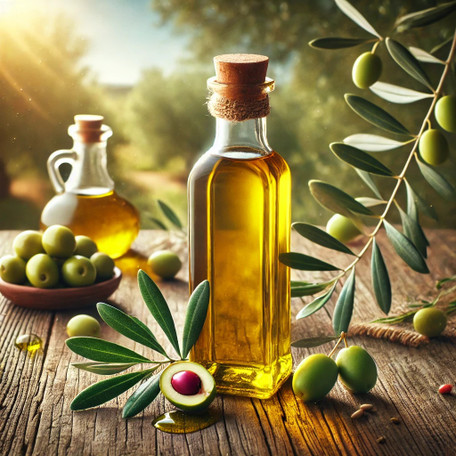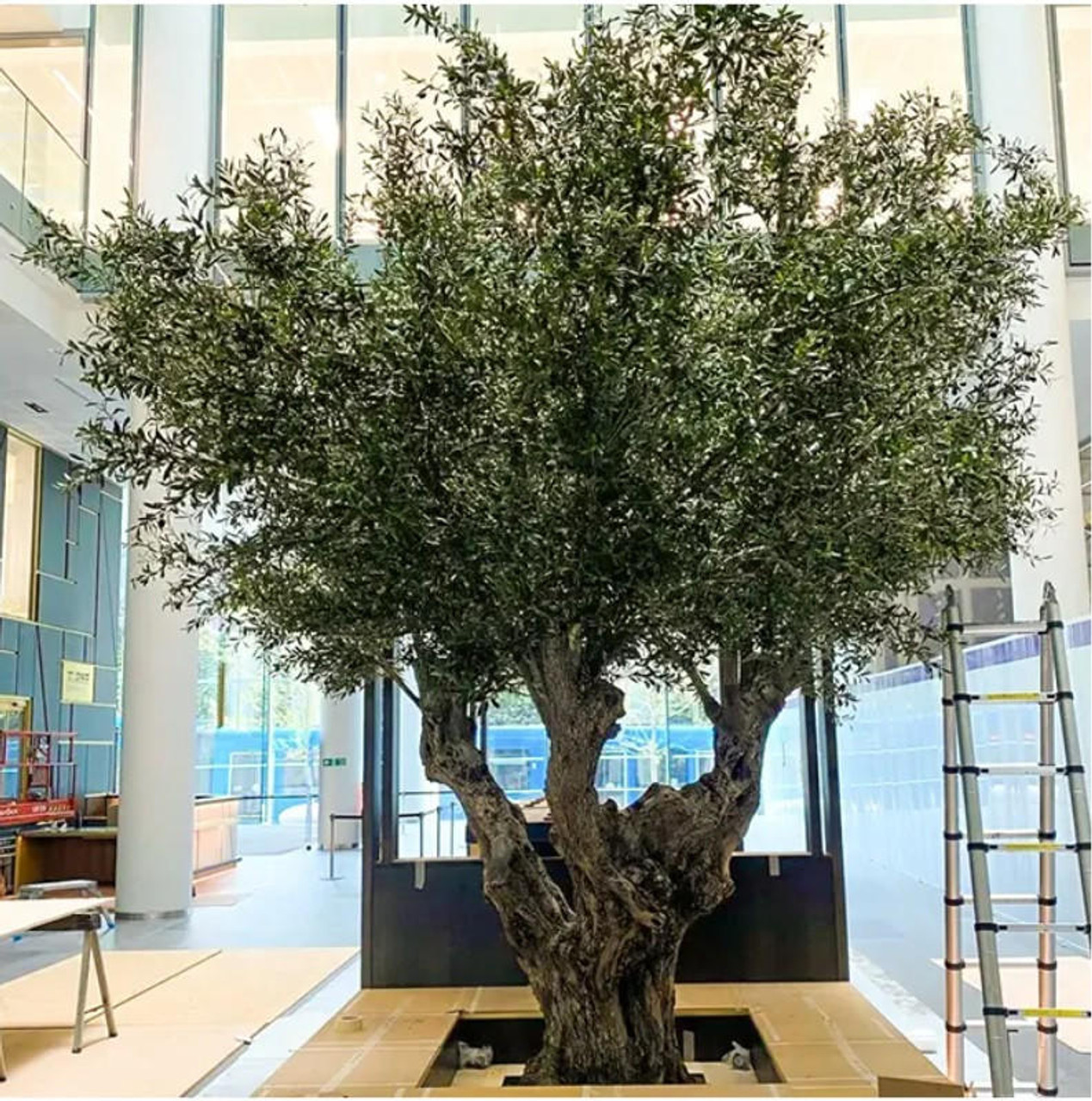The Health Benefits of Olive Oil: From Tree to Table
Aug 10, 2024
The Health Benefits of Olive Oil: From Tree to Table
Olive oil, often referred to as "liquid gold," has been a cornerstone of Mediterranean diets for centuries, praised not only for its rich flavor but also for its numerous health benefits. From the olive tree to the table, the journey of olive oil is one of tradition, meticulous care, and scientific validation. This blog will explore the process of making olive oil and delve into the extensive health benefits that have been supported by scientific research, making olive oil a staple in kitchens worldwide.
The Process of Making Olive Oil: From Harvest to Bottle
The journey of olive oil begins in the olive groves, where trees laden with olives are meticulously cultivated and harvested. The process of making olive oil is both an art and a science, requiring careful attention to detail at every stage to ensure the highest quality product.
1. Cultivation and Harvesting
Olive trees thrive in Mediterranean climates, characterized by hot, dry summers and mild, wet winters. These hardy trees can live for hundreds of years, producing olives annually. The cultivation of olive trees requires minimal intervention, making it a sustainable agricultural practice. The trees are typically grown in groves, where they are pruned and maintained to ensure healthy growth and optimal olive production.
The timing of the harvest is crucial in determining the quality and flavor of the olive oil. Olives are harvested at varying stages of ripeness, depending on the desired characteristics of the oil. Green olives, harvested early in the season, produce oil with a more intense flavor and higher levels of polyphenols, which are antioxidants with numerous health benefits. Riper, black olives yield a milder, fruitier oil with a golden hue.
Harvesting is traditionally done by hand, although mechanical methods are also used in larger-scale operations. The olives are carefully picked to avoid bruising, which can lead to oxidation and spoilage. Once harvested, the olives are quickly transported to the mill to begin the extraction process, as delays can lead to a degradation in oil quality.
2. Crushing and Malaxation
At the mill, the olives are washed to remove dirt and debris before being crushed into a paste. Traditionally, olives were crushed using large stone wheels, but modern mills use stainless steel rollers or hammer mills for greater efficiency. The entire olive, including the pit, is crushed to extract the oil.
The resulting olive paste is then subjected to a process called malaxation, where it is slowly stirred or kneaded for 20 to 40 minutes. Malaxation allows the small oil droplets to merge into larger ones, making it easier to extract the oil. This step is conducted at controlled temperatures, usually below 27°C (80°F), to preserve the oil’s quality and prevent the loss of volatile compounds that contribute to its flavor and aroma. This method is known as cold pressing and is crucial for producing extra virgin olive oil, the highest quality category of olive oil.
3. Extraction and Separation
After malaxation, the olive paste undergoes a process of separation to extract the oil. In traditional methods, the paste is spread on woven mats and pressed, forcing the oil and water out of the solid matter. However, modern methods use centrifugation, where the paste is spun at high speeds to separate the oil from the water and solid residues.
The liquid extracted from the paste is a mixture of oil and water. This mixture is then passed through a vertical centrifuge, which separates the oil from the water due to their different densities. The resulting oil is often filtered to remove any remaining impurities, although some producers choose to leave the oil unfiltered to preserve its full flavor and nutritional content.
4. Bottling and Storage
Once extracted, the olive oil is stored in stainless steel tanks to protect it from light, heat, and oxygen, which can cause the oil to degrade. The oil is then bottled in dark glass or metal containers to further protect it from oxidation and maintain its quality. Proper storage is essential for preserving the health benefits and flavor of olive oil.
Extra virgin olive oil, the highest quality, is bottled without any refining or chemical processing. It is this unrefined, pure oil that contains the highest levels of beneficial compounds, including polyphenols, oleic acid, and vitamin E, which contribute to its health-promoting properties.
The Health Benefits of Olive Oil: A Nutritional Powerhouse
Olive oil is more than just a culinary ingredient; it is a powerful ally in promoting health and preventing chronic diseases. Scientific research has extensively documented the health benefits of olive oil, which stem from its unique composition of healthy fats, antioxidants, and bioactive compounds.
1. Heart Health: A Protector Against Cardiovascular Disease
One of the most well-established health benefits of olive oil is its positive impact on heart health. Numerous studies have shown that consuming olive oil can reduce the risk of cardiovascular diseases, including heart attacks and strokes.
The primary fat in olive oil is monounsaturated fat, specifically oleic acid, which has been shown to lower levels of harmful LDL cholesterol while maintaining or even increasing beneficial HDL cholesterol. High levels of LDL cholesterol can lead to the buildup of plaque in the arteries, increasing the risk of atherosclerosis and heart disease. By lowering LDL cholesterol and improving overall lipid profiles, olive oil helps protect against these conditions.
In addition to its lipid-lowering effects, olive oil is rich in antioxidants, particularly polyphenols, which have anti-inflammatory properties. Chronic inflammation is a key driver of cardiovascular disease, and the polyphenols in olive oil help reduce inflammation by neutralizing free radicals and preventing oxidative stress.
The benefits of olive oil for heart health were famously highlighted in the landmark PREDIMED study, a large-scale clinical trial that investigated the effects of the Mediterranean diet on cardiovascular health. Participants who consumed a Mediterranean diet enriched with extra virgin olive oil had a significantly lower risk of major cardiovascular events compared to those on a low-fat diet. This study provided strong evidence that olive oil, as a central component of the Mediterranean diet, plays a crucial role in reducing cardiovascular risk.
2. Anti-Inflammatory Properties: Combating Chronic Diseases
Chronic inflammation is at the root of many modern diseases, including cancer, diabetes, and neurodegenerative disorders. Olive oil’s anti-inflammatory properties make it a valuable tool in the prevention and management of these conditions.
The polyphenols in olive oil, such as oleocanthal, have been shown to have similar anti-inflammatory effects to ibuprofen, a commonly used non-steroidal anti-inflammatory drug (NSAID). Oleocanthal works by inhibiting the activity of inflammatory enzymes, specifically cyclooxygenase (COX) enzymes, which play a role in the inflammatory process.
In addition to polyphenols, the monounsaturated fats in olive oil also contribute to its anti-inflammatory effects. These fats have been shown to reduce markers of inflammation, such as C-reactive protein (CRP), in the blood. By reducing inflammation, olive oil helps lower the risk of chronic diseases that are linked to long-term inflammatory processes.
3. Cancer Prevention: A Shield Against Tumor Development
Olive oil’s potential role in cancer prevention has been the subject of extensive research, with studies suggesting that it may help reduce the risk of certain types of cancer, particularly breast and colorectal cancers.
The antioxidants in olive oil, including polyphenols and vitamin E, play a key role in its anti-cancer properties. These compounds help protect cells from oxidative damage caused by free radicals, which can lead to DNA mutations and the development of cancerous cells. Polyphenols, in particular, have been shown to inhibit the growth of cancer cells and induce apoptosis, or programmed cell death, in tumor cells.
Research has also highlighted the role of oleic acid, the main monounsaturated fat in olive oil, in cancer prevention. Oleic acid has been shown to suppress the overexpression of the HER2/neu oncogene, which is involved in the development and progression of certain types of breast cancer. By targeting this oncogene, oleic acid helps reduce the risk of tumor formation and growth.
Moreover, the anti-inflammatory properties of olive oil also contribute to its cancer-preventive effects. Chronic inflammation is a known risk factor for cancer, and by reducing inflammation, olive oil may help lower the risk of cancer development.
4. Cognitive Health: Protecting the Brain from Degenerative Diseases
The health benefits of olive oil extend beyond the heart and body to the brain, where it plays a protective role against cognitive decline and neurodegenerative diseases such as Alzheimer’s disease.
The Mediterranean diet, rich in olive oil, has been associated with better cognitive function and a lower risk of dementia and Alzheimer’s disease. One of the key components of olive oil that contributes to brain health is oleocanthal, which has been shown to help clear beta-amyloid plaques from the brain. These plaques are a hallmark of Alzheimer’s disease and contribute to the degeneration of brain cells.
In addition to oleocanthal, the monounsaturated fats in olive oil support brain health by maintaining the integrity of cell membranes and promoting efficient communication between brain cells. These fats also help reduce inflammation and oxidative stress in the brain, both of which are implicated in cognitive decline.
Research has also suggested that olive oil’s antioxidants may help protect against age-related cognitive decline by preserving brain function and preventing the accumulation of harmful substances that contribute to neurodegeneration. Regular consumption of olive oil has been associated with improved memory, learning, and overall cognitive performance in older adults.
5. Weight Management: Aiding in Healthy Weight Loss
Contrary to the common misconception that all fats contribute to weight gain, the healthy fats in olive oil can actually aid in weight management and healthy weight loss.
Olive oil is energy-dense, meaning it provides a concentrated source of calories. However, its monounsaturated fats have been shown to increase satiety, helping individuals feel fuller for longer periods. This can reduce overall calorie intake and prevent overeating, which is beneficial for weight management.
Moreover, the consumption of olive oil has been linked to increased metabolic rate and improved fat oxidation, which can help the body burn fat more efficiently. The inclusion of olive oil in a balanced diet, such as the Mediterranean diet, has been associated with lower body weight and a reduced risk of obesity.
It is important to note that while olive oil can support weight loss and weight management, it should be consumed in moderation as part of a balanced diet. Overconsumption of any fat, including olive oil, can lead to an excess of calories and potential weight gain.
6. Skin Health: Nourishing and Protecting the Skin
Olive oil has long been used as a natural remedy for skin care, thanks to its nourishing and protective properties. The antioxidants and healthy fats in olive oil make it an excellent choice for maintaining healthy, radiant skin.
The vitamin E in olive oil acts as a powerful antioxidant, protecting the skin from oxidative damage caused by environmental factors such as pollution and UV radiation. This helps prevent premature aging, including the formation of wrinkles and fine lines. Vitamin E also promotes skin healing and regeneration, making it beneficial for treating scars, burns, and other skin injuries.
Olive oil’s moisturizing properties are another reason for its popularity in skincare. The healthy fats in olive oil help lock in moisture, keeping the skin hydrated and supple. This is particularly beneficial for individuals with dry or sensitive skin, as olive oil can soothe irritation and reduce inflammation.
In addition to its topical benefits, the consumption of olive oil also supports skin health from within. The anti-inflammatory properties of olive oil help reduce skin inflammation, while its antioxidants protect against cellular damage, promoting a healthy complexion.
Conclusion
From the ancient groves of the Mediterranean to modern kitchens around the world, olive oil has earned its reputation as a health-promoting superfood. The process of making olive oil, from the careful cultivation and harvesting of olives to the meticulous extraction and bottling, preserves its rich flavor and numerous health benefits.
Scientific research has extensively documented the positive impact of olive oil on health, from protecting the heart and reducing inflammation to preventing cancer and supporting cognitive function. Its role in weight management and skin health further highlights the versatility and importance of this "liquid gold" in our diets.
Incorporating olive oil into your daily meals is a simple yet effective way to enhance your overall health and well-being. Whether drizzled over salads, used in cooking, or enjoyed with bread, olive oil brings both flavor and health benefits to the table. As we continue to explore the health benefits of olive oil, it remains a timeless and essential component of a balanced, nutritious diet.





